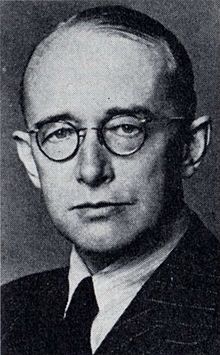Otto zu Rantzau
Otto Gisbert Adolf Gustav Kurt Graf zu Rantzau (born July 14, 1888 in Karlsruhe , † February 4, 1946 in Nierstein ) was a German lawyer , ministerial official and police chief .
Live and act
Otto Graf zu Rantzau came from the Holstein noble family Rantzau ; he was the son of Major Johann Heinrich Ernst Graf zu Rantzau (1847–1908) and his wife Marie, b. Freiin Vincke (1861-1890). His grandfather was Count Otto von Rantzau (1809–1864), who was an attaché in Paris , legation councilor and later as envoy in the diplomatic service of Prussia .
Rantzau graduated from high school with the grade "very good" at the high school in Baden-Baden and then took the subject law at the universities of Geneva , Heidelberg and Kiel , which he graduated in 1912 with the grade "good" in the first legal state examination. Since 1909 he was a member of the Corps Guestphalia Heidelberg .
During the court and government traineeship with the Provincial Government of Schleswig-Holstein , which began in 1913 , he was with the District Administrator of the Eiderstedt district in 1914 . In 1918 he became a government assessor , in 1925 a government councilor and in 1928 a senior government councilor in Schleswig . Four months later he was hired as deputy district administrator of the Johannisburg district in the province of East Prussia , in 1928 as district administrator of the Segeberg district in the province of Schleswig-Holstein .
In the course of the Prussian strike in 1932, the right-wing conservative Count zu Rantzau was commissioned to replace the ousted Social Democrat Karl Dietrich with the office of Police President in Kiel. In this position he supported the National Socialists in the conquest of power in Kiel by expanding the police apparatus into a persecution instrument, in particular by building up the local Gestapo , of which he became chief. The renaming of the Neumarkt in Adolf-Hitler-Platz and the Strandweg in Hindenburgstrasse / Hindenburgufer go back to his right to propose as police chief. Count Rantzau was also culpably involved in the lynching of the Jewish lawyer Friedrich Schumm on April 1, 1933 , after he had granted armed SA and SS hordes access to Schumm, who was imprisoned in the police prison, and approved his murder.
In April 1934, Count Rantzau was replaced in the office of the Kiel Police President by the National Socialist Joachim Meyer-Quade . He himself moved with his wife Lilli born in 1917 . Freiin von Maltzahn and the two sons Hans Friedrich (born November 18, 1918) and Kay (born December 18, 1921) as Ministerialrat in the Reich Ministry for Science, Education and National Education in Berlin . An illness that began in 1939 forced him into early retirement in 1943. After both sons fell in World War II , Otto Graf zu Rantzau died in 1946 of shrinking kidneys in a refugee camp in Nierstein .
Individual evidence
- ^ Family tree of the Rantzaus
- ↑ Kösener Corpslisten 1960, 64 , 999
- ^ Jutta Schemm: Street renaming in Kiel between 1900 and 1970. In: Jürgen Jensen (Hrsg.): Mitteilungen der Gesellschaft für Kieler Stadtgeschichte. Volume 79, Kiel 1995-1999, pp. 189-190.
- ↑ Eckhard Colmorgen et al. (Red.): Antifascist city tours Kiel 1933-1945. Publication of the Asche Process Working Group, Kiel 1998, pp. 16-17.
- ↑ Uwe Danker , Astrid Schwabe: Schleswig-Holstein and National Socialism. Neumünster 2005. ISBN 3-529-02810-X . P. 104.
literature
- 100 years of district administrators in the Segeberg district. In: Heimatkundliches Jahrbuch für die Kreis Segeberg 1967. Bad Segeberg 1967, pp. 23–38.
Web links
- Literature by and about Otto zu Rantzau in the catalog of the German National Library
- Otto zu Rantzau in the online version of the edition files of the Reich Chancellery. Weimar Republic
| personal data | |
|---|---|
| SURNAME | Rantzau, Otto too |
| ALTERNATIVE NAMES | Rantzau, Otto Gisbert Adolf Gustav Kurt Graf zu (full name) |
| BRIEF DESCRIPTION | German lawyer, ministerial official and police president |
| DATE OF BIRTH | July 14, 1888 |
| PLACE OF BIRTH | Karlsruhe |
| DATE OF DEATH | February 4, 1946 |
| Place of death | Nierstein |
